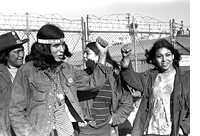
On November 20, 1969, sometime after 2 a.m., a fleet of wooden sailboats holding 90 Native Americans landed on Alcatraz. For the next 19 months, the group forcibly occupied the island, hoping to reclaim the rock “in the name of all American Indians.” Although federal marshals eventually removed the protesters, and their demands — including title to the island and the construction of a Native American university — were never granted, scholars view the two-year protest as a springboard for modern-day Indian activism.
James Fortier captures this overlooked chapter of the civil rights movement in his documentary Alcatraz Is Not an Island, which airs on PBS in November. With its straight-ahead, chronological narrative, the film often has a dry, educational feel. Nevertheless, by weaving together interviews with student occupiers and never-before-seen archival footage, Alcatraz creates a powerful snapshot of this revolutionary incident and gives life to the words of charismatic protest leader Richard Oakes: “Alcatraz is not an island. It’s an idea. It’s the idea that you can recapture and be in control of your life and your destiny.”















